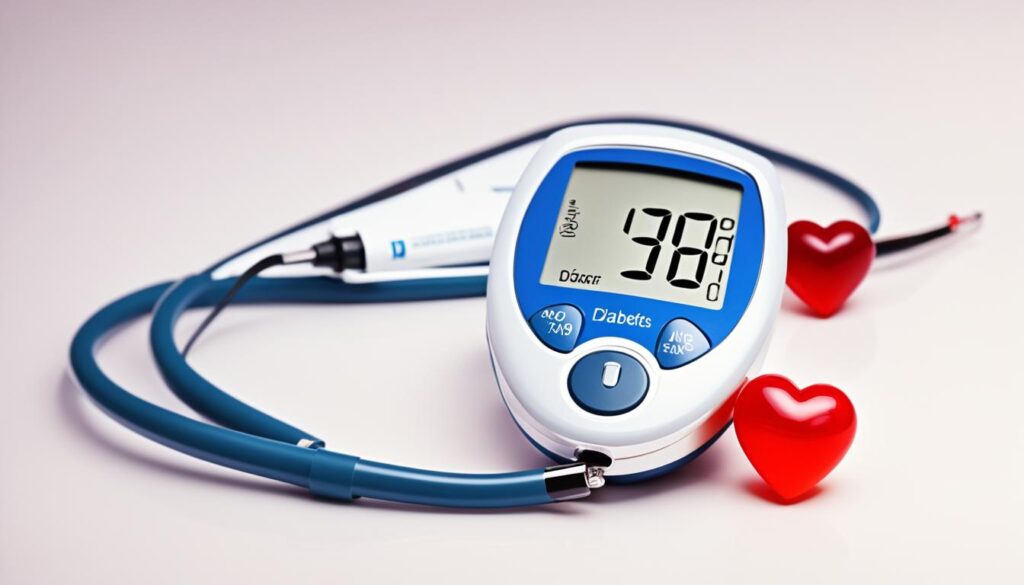Diabetes is becoming more common worldwide, and it’s vital to know how it affects heart health. Studies show that people with Type 2 diabetes are up to four times more likely to die from heart-related issues1. This fact shows the strong link between diabetes and heart problems.
Diabetes can harm the heart and blood vessels. It can cause early heart disease and increase the chance of heart attacks and sudden death1. Also, diabetes raises the risk of heart failure. It can damage the heart muscle, making it stiff and leading to fluid buildup and other heart problems1.

Key Takeaways
- People with diabetes are up to four times more likely to die from cardiovascular causes compared to the general population.
- Diabetes can lead to premature, accelerated coronary artery disease, increasing the risk of recurrent heart attacks and sudden cardiac death.
- Diabetes can damage the heart muscle and make it stiffer, leading to an increased risk of heart failure.
- Ongoing research aims to detect diabetic heart disease earlier and prevent serious consequences through advanced cardiac imaging techniques.
- Proper management of blood glucose, blood pressure, cholesterol, and lifestyle factors can significantly improve heart health for individuals with diabetes.
Introduction: The Link Between Diabetes and Cardiovascular Disease
Diabetes is a serious condition that can harm your heart health. People with diabetes are almost twice as likely to get heart disease or stroke than those without it2. Diabetes is a big risk factor for heart disease. It’s important for people with diabetes to know this.
Understanding the Increased Risk of Heart Conditions for People with Diabetes
There’s a strong link between diabetes and heart disease. Diabetes can harm the blood vessels and nerves that control the heart2. This can lead to heart conditions like coronary artery disease, heart attacks, and heart failure3. People with diabetes often get these heart problems younger than those without it3.
Issued in public interest (Official Website)
High blood glucose levels are a big reason why people with diabetes face more heart risks. High blood sugar can cause inflammation, which damages blood vessel linings and leads to plaque buildup, a sign of heart disease2. Diabetes also makes it hard for the body to manage blood pressure and cholesterol, making heart problems worse.
“People with diabetes tend to develop heart disease at a younger age than people without diabetes, and adults with diabetes are nearly twice as likely to have heart disease or stroke as adults without diabetes.”2
Diabetes: A Major Risk Factor for Heart Disease
Diabetes is a serious condition that affects heart health4. The Centers for Disease Control and Prevention (CDC) say high blood glucose from diabetes can harm blood vessels and nerves that control the heart4. This can lead to heart disease over time4.
People with diabetes often get heart disease younger than those without it4. Adults with diabetes are almost twice as likely to have heart disease or stroke as those without it4.
The Impact of High Blood Glucose Levels on Blood Vessels and Heart Function
High blood glucose levels can cause inflammation and damage to blood vessels45. This makes it harder for the heart to pump blood and increases the risk of heart attack and stroke45. It’s important to keep blood sugar levels under control to prevent these problems5.
Changing your lifestyle and taking medication are important for managing diabetes and lowering the risk of heart disease and stroke5. Making healthy choices helps keep blood sugar levels in check and reduces the risk of heart problems5.

“High blood glucose from diabetes can damage blood vessels and the nerves that control the heart and blood vessels, leading to heart disease over time.”
Complications of Diabetes that Affect the Heart
People with diabetes are more likely to get heart problems. One big worry is getting coronary artery disease, which can cause heart attacks6. Diabetes can also lead to “silent” heart attacks, where there are no warning signs like chest pain6. Plus, the heart of those with diabetes may not heal well after a heart attack, raising the chance of heart failure6.
Coronary Artery Disease, Heart Attacks, and Silent Heart Attacks
Diabetes is a big risk for coronary artery disease, which damages and narrows the main blood vessels to the heart6. This can lead to a heart attack when blood flow to the heart stops suddenly. Sadly, those with diabetes are more likely to have “silent” heart attacks, with no chest pain or other usual signs6.
Heart Failure and Impaired Healing After a Heart Attack
Diabetes can also cause heart failure, where the heart can’t pump blood well7. And, people with diabetes may not heal properly after a heart attack, making heart failure more likely6.
It’s important to manage these heart issues for those with diabetes. Keeping an eye on blood sugar, blood pressure, and cholesterol, and living a healthy life can lower risks and keep the heart healthy67.
“Diabetes is a major risk factor for coronary artery disease, which can lead to heart attacks. People with diabetes are also at a higher risk of experiencing ‘silent’ heart attacks, where they may not feel any chest pain or other typical symptoms.”6
The diabetes affect heart health Connection
The link between diabetes and heart health is clear8. Diabetes can harm the blood vessels and nerves that control the heart, raising the risk of heart disease and stroke8. In fact, people with diabetes are nearly twice as likely to develop heart disease or have a stroke compared to those without diabetes8.
High blood sugar from diabetes can cause inflammation and damage to blood vessels. It also makes it harder for the heart to pump blood, increasing the risk of heart problems8. High blood pressure, combined with diabetes, greatly increases the risk for heart disease9. High levels of LDL (“bad”) cholesterol can lead to plaque formation on damaged artery walls8.
Elevated triglycerides and low HDL (“good”) cholesterol or high LDL cholesterol contribute to hardening of the arteries8. People with diabetes are at greater risk of heart failure, a condition where the heart can’t pump blood effectively8.
Issued in public interest (Official Website)
But, lifestyle habits such as following a healthy diet, maintaining a healthy weight, staying physically active, managing blood sugar (A1C), blood pressure, and cholesterol levels, and stopping smoking can help lower the risk of heart disease in individuals with diabetes8. By understanding the link between diabetes and cardiovascular disease, individuals can take proactive steps to protect their heart health9.

“People living with Type 2 diabetes are more likely to develop and die from cardiovascular diseases, such as heart attacks, strokes, and heart failure, than people who don’t have diabetes.”9
The Centers for Disease Control and Prevention (CDC) stress the need to manage the ABCs of diabetes – A1C, Blood Pressure, and Cholesterol – to lower the risk of cardiovascular disease8. By grasping the connection between diabetes and heart health, people can act to safeguard their heart and overall health.
Other Risk Factors That Compound Heart Disease Risk
Diabetes is a big risk for heart disease, but it gets worse with other health issues. The CDC says people with diabetes are at higher risk of heart disease if they smoke, have high blood pressure, or bad cholesterol10.
The Role of Smoking, High Blood Pressure, and Abnormal Cholesterol Levels
Smoking makes heart disease risk go up, especially with diabetes. It can make blood vessels narrow and raise the risk of lung problems, leg infections, and losing a limb10. High blood pressure and bad cholesterol levels add to the heart risks for diabetics11.
The Impact of Obesity, Belly Fat, and Chronic Kidney Disease
Being overweight, especially around the waist, increases heart disease risk for diabetics11. Chronic kidney disease also makes heart health worse for those with diabetes11.
Living a healthy life and managing diabetes with a healthcare team is key to lowering heart disease risks. By tackling these extra risks, diabetics can protect their heart health1011.
Managing the ABCs of Diabetes for Heart Health
For people with diabetes, keeping an eye on the “ABCs” – A1C, blood pressure, and cholesterol – is key. This helps lower the risk of heart disease and other heart problems12. By hitting these targets, you can boost your heart health and prevent serious issues like heart attacks and strokes.
A1C, Blood Pressure, and Cholesterol Targets for Reducing Cardiovascular Risk
The American Diabetes Association suggests an A1C goal of less than 7% for many with diabetes1213. This keeps blood sugar in check and eases the load on your heart. For blood pressure, aim for a reading below 130/80 mm Hg1213.
Issued in public interest (Official Website)
Keeping an eye on cholesterol is also vital. Aim for HDL (good) cholesterol above 40 mg/dL for men and 50 mg/dL for women. Also, keep LDL (bad) cholesterol under 70 mg/dL and triglycerides at 150 mg/dL or less13. Testing your cholesterol once a year helps track your progress and adjust treatments13.
Staying on top of these “ABC” targets can greatly cut the risk of heart disease and related heart issues for those with diabetes121314.

“Achieving the recommended A1C, blood pressure, and cholesterol targets can substantially lower the risk of cardiovascular disease for people with diabetes.”
Lifestyle Changes for a Healthier Heart
Living with diabetes means making key lifestyle changes to keep your heart healthy. Diabetes lifestyle changes heart health are vital for those with diabetes, as they’re at higher risk for heart problems. By changing your diet, exercise, and how you handle stress, you can boost your heart health.
Healthy Eating, Exercise, and Stress Management Strategies
Eating right and staying active are key to managing diabetes and keeping your heart healthy. Eat lots of fruits, veggies, whole grains, lean meats, and healthy fats. Cut down on sugars, refined carbs, and saturated fats15. Try to get in 150 minutes of moderate exercise each week to lower heart disease risk15.
Managing stress is also important for your heart. Try yoga, deep breathing, or fun hobbies to reduce stress15.
Quitting smoking is a big step towards heart health. Smoking and diabetes both harm your blood vessels, raising the risk of heart attack and stroke15. Quitting can cut your heart disease risk in half after a year without cigarettes15.
Keeping a healthy weight is key for your heart15. A BMI over 25 can lead to high cholesterol and blood pressure, increasing heart disease and stroke risk15. Work towards a healthy BMI through lifestyle changes.
Regular health checks, like blood pressure and cholesterol tests, are crucial16. These tests help catch heart disease early, preventing damage to your heart and blood vessels16.
By following these diabetes lifestyle changes heart health tips, you can lower your risk of heart problems. Remember, small changes can lead to big improvements in your heart health.

Medications for Protecting the Heart
Medications are key for people with diabetes to keep their hearts healthy17. They help manage blood sugar, blood pressure, and cholesterol levels. This lowers the risk of heart disease17. Doctors may also prescribe medicines for heart conditions or to prevent blood clots.
Two types of diabetes drugs are approved for heart health17. These drugs have been shown to cut the risk of heart disease death in a few years17. Empagliflozin lowers blood sugar and reduces heart failure risk17. Liraglutide manages blood sugar, helps with weight loss, and lowers heart attack or stroke risk17. Empagliflozin and liraglutide are used to treat or prevent heart disease in diabetes patients.
Issued in public interest (Official Website)
Other medicines for diabetes and heart health include metformin, GLP-1 receptor agonists, SGLT2 inhibitors, insulin, statins, and low-dose aspirin18. These drugs help control blood sugar, cholesterol, and blood pressure. This reduces heart-related risks.
| Medication | Mechanism of Action | Benefits for Heart Health |
|---|---|---|
| Metformin | Reduces glucose production in the liver | First-line therapy for newly diagnosed Type 2 diabetes18 |
| GLP-1 receptor agonists | Stimulate insulin release and lower glucose production | Can help manage blood sugar levels and reduce the risk of cardiovascular events18 |
| SGLT2 inhibitors | Prevent glucose reabsorption in the kidneys | Can reduce the risk of heart failure and chronic kidney disease progression18 |
| Insulin | Regulates blood sugar levels | Different types have varying onset times, peak times, and durations of action18 |
| Statins | Lower cholesterol levels | Recommended for most people to reduce the risk of heart attack and stroke18 |
| Aspirin | Antiplatelet medication | Low-dose aspirin regimen may be recommended as a preventive measure against cardiovascular disease and stroke18 |

Working with a healthcare team, people with diabetes can find the best medications for their heart health17. Using these medicines and making lifestyle changes can greatly improve their health and life quality171819.
Early Detection and Diagnosis of Heart Disease
People with diabetes are at a higher risk of getting heart disease20. Doctors use tests like blood tests, ECGs, stress tests, and imaging scans to check for heart health issues early20. Knowing your family history is also key, especially if relatives got heart disease young, which can double your risk21.
Spotting heart problems early is crucial for starting treatment quickly to prevent worse issues21. Studies show that catching type 2 diabetes early and treating it can lead to big health benefits21. Waiting three years to diagnose and treat diabetes and heart risks can reduce the risk by 3.3% and 29% respectively21. Waiting six years can cut the risk by 4.9% and 38%21.
Issued in public interest (Official Website)
Regular check-ups are key for people with diabetes to catch heart disease early21. The Michigan Model for Type 2 Diabetes is a useful tool for doctors to predict diabetes progression and its effects on health and costs21.
Diagnostic Tests and Family History Evaluation
Tests for heart health include EKG, Echocardiogram, and Exercise stress test20. Invasive tests like Nuclear stress test and Coronary angiogram are also used20. The Nuclear stress test checks blood flow to the heart during exercise, while Coronary angiogram shows blockages in heart arteries20.
Doctors also look at your family history for heart disease risk21. Having heart disease in family members before age 50 can increase your risk21. Early detection and treatment are key to managing this risk.

| Risk Factor | Optimal Level |
|---|---|
| Total Cholesterol | Less than 200 mg/dL (5.2 mmol/L)22 |
| LDL Cholesterol | Less than 100 mg/dL (2.6 mmol/L)22 |
| HDL Cholesterol | Men: Over 40 mg/dL (1.0 mmol/L) Women: Over 50 mg/dL (1.3 mmol/L)22 |
| Triglycerides | Less than 150 mg/dL (1.7 mmol/L)22 |
| hs-CRP | Less than 2.0 mg/L22 |
| Lp(a) | Optimal level not established22 |
| Ceramides | Optimal level not established22 |
| Troponin T | Optimal level not established22 |
This table shows the best levels for heart health risk factors22. It helps doctors assess your risk and plan your treatment.
Taking Action to Reduce Cardiovascular Risk
People with diabetes are at a higher risk of heart disease. It’s important to take steps to lower this risk23. Making lifestyle changes can greatly reduce the chance of getting diabetic heart disease.
Quit Smoking, Lose Weight, and Control Blood Pressure and Cholesterol
Stopping smoking is a big step to protect your heart if you have diabetes23. Smoking can raise blood pressure and increase the risk of heart attack and stroke. Quitting can greatly lower these risks23. Keeping a healthy weight is also key, as being overweight can strain the heart2324.
Issued in public interest (Official Website)
Managing high blood pressure and bad cholesterol levels is vital2324. You can do this with a heart-healthy diet and exercise. Sometimes, you might need medicine from a doctor.

By making these positive changes, individuals with diabetes can take proactive steps to minimize their risk of devastating cardiovascular outcomes.
“Quitting smoking is the most important lifestyle change to improve heart health.”24
Adding these strategies to your daily life can help fight diabetes-related heart disease2324. The main thing is to act and choose lifestyles that focus on heart health. This can greatly improve your overall health and life quality.
Conclusion
The link between diabetes and heart disease is clear. Diabetes greatly increases the risk of heart problems. It can harm blood vessels and nerves that control the heart, leading to heart attacks and strokes25. Adults with diabetes are at a higher risk of dying from heart disease than those without it26.
But, there is hope. By managing diabetes well and making healthy choices, people with diabetes can lower their heart disease risk25. Important steps include controlling blood sugar, blood pressure, and cholesterol. This can be done through diet, medicine, exercise, and lifestyle changes25. Regular exercise, eating right, and quitting smoking are also key to preventing heart disease in diabetics.
Issued in public interest (Official Website)
The relationship between diabetes and heart health is complex. Yet, by actively managing diabetes and addressing risk factors, diabetics can improve their heart health and lower their risk of serious heart problems26. Working together with healthcare professionals is crucial for effective care for diabetics with heart disease.
FAQ
What is the connection between diabetes and heart health?
The Mayo Clinic says more people worldwide have diabetes now. This condition raises the risk of heart disease. People with Type 2 diabetes might be up to four times more likely to die from heart-related issues.
Diabetes can harm blood vessels and make the heart muscle stiff. This can cause fluid retention and heart failure.
How does diabetes increase the risk of heart disease?
The CDC notes that high blood glucose from diabetes can damage blood vessels and heart nerves. Over time, this can lead to heart disease. People with diabetes often get heart disease younger than those without it.
Adults with diabetes are nearly twice as likely to have heart disease or stroke as those without it.
What are some of the cardiovascular complications associated with diabetes?
The Mayo Clinic says diabetes increases the risk of coronary artery disease, which can cause heart attacks. It can also lead to “silent” heart attacks without chest pain or other signs.
Diabetes can make the heart muscle not heal well after a heart attack. This raises the risk of heart failure.
What other risk factors compound the cardiovascular risks for those with diabetes?
The CDC says diabetes raises heart disease risk even more with other factors like smoking, high blood pressure, and bad cholesterol. Smoking, high blood pressure, and bad cholesterol levels all increase the risk of heart disease in people with diabetes.
How can people with diabetes manage their heart health?
The CDC advises managing the “ABCs” – A1C (blood glucose), Blood pressure, and Cholesterol – to lower heart disease and stroke risk. It also suggests a healthy diet, regular exercise, and quitting smoking to protect the heart.
What tests can help detect cardiovascular disease in people with diabetes?
The CDC says tests like blood tests, ECGs, stress tests, and imaging scans help find cardiovascular disease in diabetes patients. Family history is also key, as a history of heart disease in relatives before age 50 can double the risk.
Source Links
- Mayo Clinic Q and A: How does diabetes affect the heart? – Mayo Clinic News Network – https://newsnetwork.mayoclinic.org/discussion/mayo-clinic-q-and-a-how-does-diabetes-affect-the-heart/
- Diabetes and cardiovascular disease: Epidemiology, biological mechanisms, treatment recommendations and future research – https://www.ncbi.nlm.nih.gov/pmc/articles/PMC4600176/
- Diabetes and Heart Disease – https://www.hopkinsmedicine.org/health/conditions-and-diseases/diabetes/diabetes-and-heart-disease
- Heart Disease Risk Factors – https://www.cdc.gov/heart-disease/risk-factors/index.html
- Diabetes – https://www.heartandstroke.ca/heart-disease/risk-and-prevention/condition-risk-factors/diabetes
- Diabetes and heart disease – https://www.diabetes.org.uk/guide-to-diabetes/complications/cardiovascular_disease
- Heart Disease and Diabetes – https://www.webmd.com/diabetes/heart-blood-disease
- Your Heart and Diabetes – https://www.cdc.gov/diabetes/diabetes-complications/diabetes-and-your-heart.html
- Cardiovascular Disease and Diabetes – https://www.heart.org/en/health-topics/diabetes/diabetes-complications-and-risks/cardiovascular-disease–diabetes
- Heart Disease Risk Factors – https://www.texasheart.org/heart-health/heart-information-center/topics/heart-disease-risk-factors/
- Cardiovascular disease risk factors | Ada – https://ada.com/cardiovascular-disease-risk-factors/
- Managing Diabetes – NIDDK – https://www.niddk.nih.gov/health-information/diabetes/overview/managing-diabetes
- Managing the ABCs of Diabetes – https://memorialhermann.org/-/media/memorial-hermann/org/files/specialties/diabetes/diabetes-the-abcs-of-diabetes.ashx
- ABCS of Heart Health – https://millionhearts.hhs.gov/data-reports/factsheets/ABCS.html
- Top strategies to prevent heart disease – https://www.mayoclinic.org/diseases-conditions/heart-disease/in-depth/heart-disease-prevention/art-20046502
- Lifestyle Changes to Prevent a Heart Attack – https://www.heart.org/en/health-topics/heart-attack/life-after-a-heart-attack/lifestyle-changes-for-heart-attack-prevention
- Diabetes Medications That Treat Heart Disease, Too – https://www.hopkinsmedicine.org/health/wellness-and-prevention/diabetes-medications-that-treat-heart-disease-too
- Diabetes Medications – https://www.heart.org/en/health-topics/diabetes/prevention–treatment-of-diabetes/diabetes-medications
- New Class of Diabetes Medications Can Lower Heart Risks – https://www.aarp.org/health/conditions-treatments/info-2020/diabetes-heart-health.html
- Heart Health Tests for People with Diabetes – https://www.heart.org/en/health-topics/diabetes/symptoms-diagnosis–monitoring-of-diabetes/heart-health-tests-for-diabetes-patients
- Early Detection and Treatment of Type 2 Diabetes Reduce Cardiovascular Morbidity and Mortality: A Simulation of the Results of the Anglo-Danish-Dutch Study of Intensive Treatment in People With Screen-Detected Diabetes in Primary Care (ADDITION-Europe) – https://www.ncbi.nlm.nih.gov/pmc/articles/PMC4512138/
- Do you know which blood tests can point to heart disease? – https://www.mayoclinic.org/diseases-conditions/heart-disease/in-depth/heart-disease/art-20049357
- Heart Disease Prevention | MedlinePlus – https://medlineplus.gov/howtopreventheartdisease.html
- 8 ways to reduce your risk of heart disease – https://health.ucdavis.edu/blog/cultivating-health/8-ways-to-reduce-your-risk-of-heart-disease/2024/02
- Diabetes and heart disease: What is the connection? – https://www.medicalnewstoday.com/articles/diabetes-heart-disease-connection
- Link Between Diabetes and Heart Disease – https://mycardiologist.net/exploring-the-link-between-diabetes-and-heart-disease/